仁爱版初三英语上册练习题及答案全套
- 格式:doc
- 大小:964.50 KB
- 文档页数:57
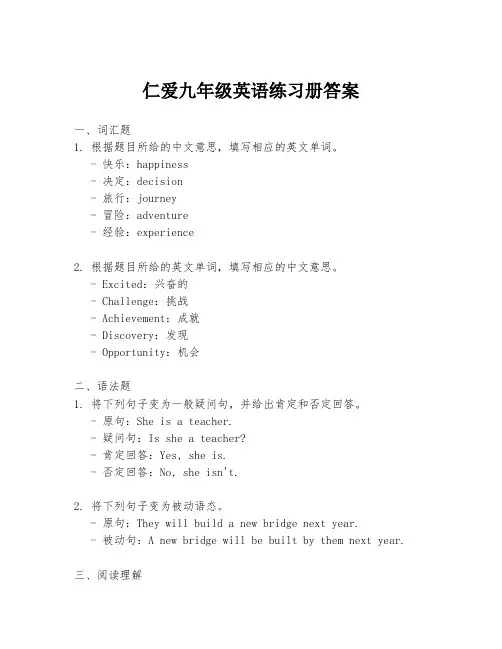
仁爱九年级英语练习册答案一、词汇题1. 根据题目所给的中文意思,填写相应的英文单词。
- 快乐:happiness- 决定:decision- 旅行:journey- 冒险:adventure- 经验:experience2. 根据题目所给的英文单词,填写相应的中文意思。
- Excited:兴奋的- Challenge:挑战- Achievement:成就- Discovery:发现- Opportunity:机会二、语法题1. 将下列句子变为一般疑问句,并给出肯定和否定回答。
- 原句:She is a teacher.- 疑问句:Is she a teacher?- 肯定回答:Yes, she is.- 否定回答:No, she isn't.2. 将下列句子变为被动语态。
- 原句:They will build a new bridge next year.- 被动句:A new bridge will be built by them next year.三、阅读理解阅读下列短文,回答后面的问题。
A New FriendTom met a new friend at school last week. His name is Jerry. Jerry is very friendly and they quickly became good friends. They often play football together after school.Questions:1. Who did Tom meet at school?Answer: Tom met a new friend named Jerry at school.2. What do they often do together?Answer: They often play football together after school.四、完形填空阅读下面的短文,从括号内选择合适的选项填入空白处。
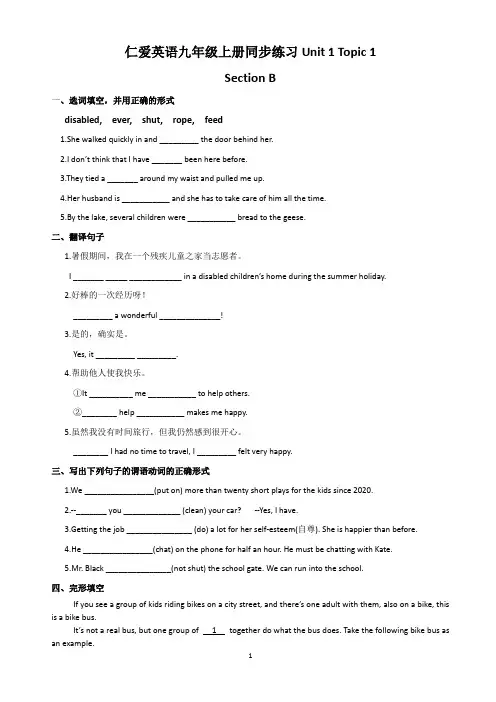
仁爱英语九年级上册同步练习Unit 1 Topic 1Section B一、选词填空,并用正确的形式disabled, ever, shut, rope, feed1.She walked quickly in and _________ the door behind her.2.I don’t think that I have _______ been here before.3.They tied a _______ around my waist and pulled me up.4.Her husband is ___________ and she has to take care of him all the time.5.By the lake, several children were ___________ bread to the geese.二、翻译句子1.暑假期间,我在一个残疾儿童之家当志愿者。
I _______ _____ ____________ in a disabled children’s home during the summer holiday.2.好棒的一次经历呀!_________ a wonderful ______________!3.是的,确实是。
Yes, it _________ _________.4.帮助他人使我快乐。
①It __________ me ___________ to help others.②________ help ___________ makes me happy.5.虽然我没有时间旅行,但我仍然感到很开心。
________ I had no time to travel, I _________ felt very happy.三、写出下列句子的谓语动词的正确形式1.We ________________(put on) more than twenty short plays for the kids since 2020.2.--_______ you _____________ (clean) your car? --Yes, I have.3.Getting the job _______________ (do) a lot for her self-esteem(自尊). She is happier than before.4.He ________________(chat) on the phone for half an hour. He must be chatting with Kate.5.Mr. Black _______________(not shut) the school gate. We can run into the school.四、完形填空If you see a group of kids riding bikes on a city street, and there’s one adult with them, also on a bike, this is a bike bus.It’s not a real bus, but one group of 1 together do what the bus does. Take the following bike bus as an example.Devin Olson is a dad in the US. He organizes a bike bus for local schools. It drops off students at 2 primary schools. “We 2 at 8 a.m. to play soccer and eat breakfast,” Olson says. Then we check our 3 and start our ride. It’s nothing but laughing.The group makes about 8 stops along the way to 4 children. “We want kids to enjoy going to school. They can ride with their parents, brothers or sisters. And they can 5 with students in different grades,”says Olson.Recently, pictures and videos of bike buses got lots of attention 6 they were posted online. “What a simple idea it is! How 7 it is to get started,” says one Weibo user.Now, many parents agree with the idea. And more 8 are giving up cars for a ride. This helps fight climate change, 9 exercise and reduce school drop-off traffic. And it also makes the children 10 than before.( )1.A.walkers B.riders C.drivers D.swimmers( )2.A.stop B.sleep C.meet D.run( )3.A.bikes B.bags C.boxes D.cars( )4.A.look after B.cheer up C.pick up D.look at( )5.A.stand B.agree C.talk D.mind( )6.A.when B.before C.until D.unless( )7.A.easy B.boring C.strange D.difficult( )8.A.schools B.families munities D.teams( )9.A.believe B.understand C.encourage D.warn( )10.A.smarter B.happier C.shyer D.taller五、词语填空There was a man. He was very rich. But he was 1.__________(fool). Other people often laughed at him. On a sunny day, he visited Mr. Zhang. He liked the three-storey(三层楼的) house of Mr. Zhang very much. He 2.__________(think) the view 3._________ the third floor was very good. He wanted to have one, too. The next day, he found a craftsman(工匠). “Please build me a house 4._________ Mr. Zhang’s,”he said to the craftsman.After a period of time, the man went to check the progress(进展). He felt very angry. “No! I only need the top floor. I don’t need the two lower floors. Remove(移开) them at once!” The craftsman laughed out loud, “Only the top floor? I can’t do it. You have to do it by 5.______________(you)!”参考答案一、1.shut 2.ever 3.rope 4. disabled 5.feeding二、1.was a volunteer 2.What; experience 3.really is/was4.①makes; happy ②To; others5.Though, still三、1. have put on 2.Have; cleaned 3.has done 4.has chatted 5.hasn’t shut四、1.B 2.C 3.A 4.C 5.C 6.A 7.A 8.B 9.C 10.B五、1.foolish 2.thought 3.from 4. like 5.yourself。
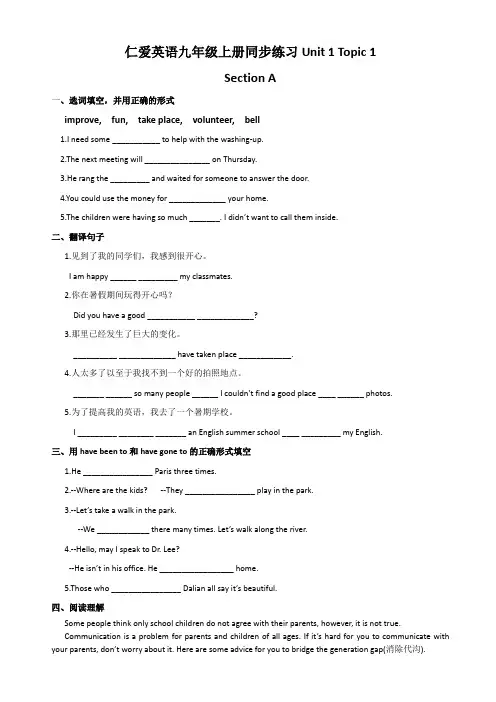
仁爱英语九年级上册同步练习Unit 1 Topic 1Section A一、选词填空,并用正确的形式improve, fun, take place, volunteer, bell1.I need some ___________ to help with the washing-up.2.The next meeting will _______________ on Thursday.3.He rang the _________ and waited for someone to answer the door.4.You could use the money for _____________ your home.5.The children were having so much _______. I didn’t want to call them inside.二、翻译句子1.见到了我的同学们,我感到很开心。
I am happy ______ _________ my classmates.2.你在暑假期间玩得开心吗?Did you have a good ___________ _____________?3.那里已经发生了巨大的变化。
__________ _____________ have taken place ____________.4.人太多了以至于我找不到一个好的拍照地点。
_______ ______ so many people ______ I couldn’t find a good place ____ ______ photos.5.为了提高我的英语,我去了一个暑期学校。
I _________ ________ _______ an English summer school ____ _________ my English.三、用have been to和have gone to的正确形式填空1.He ________________ Paris three times.2.--Where are the kids? --They ________________ play in the park.3.--Let’s take a walk in the park.--We ____________ there many times. Let’s walk along the river.4.--Hello, may I speak to Dr. Lee?--He isn’t in his office. He _________________ home.5.Those who ________________ Dalian all say it’s beautiful.四、阅读理解Some people think only school children do not agree with their parents, however, it is not true.Communication is a problem for parents and children of all ages. If it’s hard for you to communicate with your parents, don’t worry about it. Here are some advice for you to bridge the generation gap(消除代沟).Don’t argue with your parents. Don’t get to your parents when you are angry. Your parents probably won’t consider your ideas if you are shouting at them. And you can’t express yourself well if you are angry. Go to someplace to cool off. Make sure you understand why you are unhappy. Then think about what you want to say to your parents. If you don’t think yo can speak to them at the moment, try writing a letter.Try to reach a compromise(和解). Perhaps you and your parents disagree on something. You can keep your disagreement and try your best to accept each other. Michael’s mother didn’t agree with him about buying a motorcycle. They argued over it. But they finally came to a compromise. Michael bought the motorcycle, but only drove it on certain days.Of course, your parents might refuse to compromise on something. In these situations, it is especially important to show love and respect to them. Showing respect will keep your relationship strong.Talk about your values. The values of your parents are probably different from those of your own. Tell your parents what you care about, and why. Understanding your values might help them see your purposes in life.A good relationship with your parents can make you a better and happier person. It is worth having a try! ( )1.The passage tells us _______ have a communication problem.A.parents and their close friendsB.teachers and their studentsC.parents and children of all agesD.school kids and their parents( )2.Your parents probably won’t consider your ideas if you ______.A.write a letter to themB.don’t talk with them oftenC.express yourself wellD.don’t speak to them politely( )3.The underlined phrase “cool off” in the passage means ________.A.to get you quiet and relaxedB.to hide yourself quicklyC.to help make yourself happyD.to help you have a good rest( )4.If there is really a generation gap between you and your parents, you’d better _______.A.keep away from themB.have a talk with them oftenC.not talk to them any moreD.agree with them all the time( )5. What can we learn from the passage?A.There are so many serious problems in families today.B.Parents and children should not have a generation gap.C.Parents should show love and respect to their children.D. There are some good ways to bridge the generation gap.五、词语填空I took part 1.________ the winter camp at Willow Primary School on Saturday with my friends. There were many great 2._______________(activity) for us.3.______ Saturday morning, we had an art class at eight. Mr Black4.____________ (teach) us to draw cartoons. After that, at ten, we5.__________(sing) English songs with Miss Green in the music class. We had lunch at twelve. We had beef, hamburgers6.______ orange juice. There were also noodles and sandwiches. After lunch, we went to the playground and learned some kung fu with our PE teacher Mr Fred. Then, it was teatime. We had some7._________(snack), and we drank tea or coffee with our teachers. At five in the afternoon, we cooked our dinner8.__________ the help of Miss Reed. It was9. ____________(interest).10.___________ great the winter camp was!参考答案一、1.volunteers 2.take place 3.bell 4. improving 5.fun二、1.to see/meet 2.summer holiday/vacation 3.Great changes; there4.There were; that; to take5.have gone to; to improve三、1. has been to 2.have gone to 3.have been 4.has gone 5.have gone to四、1.C 2.D 3.A 4.B 5.D五、1.in 2.activities 3.on 4. taught 5.sang 6.and 7.snacks 8.with9.interesting 10.How。
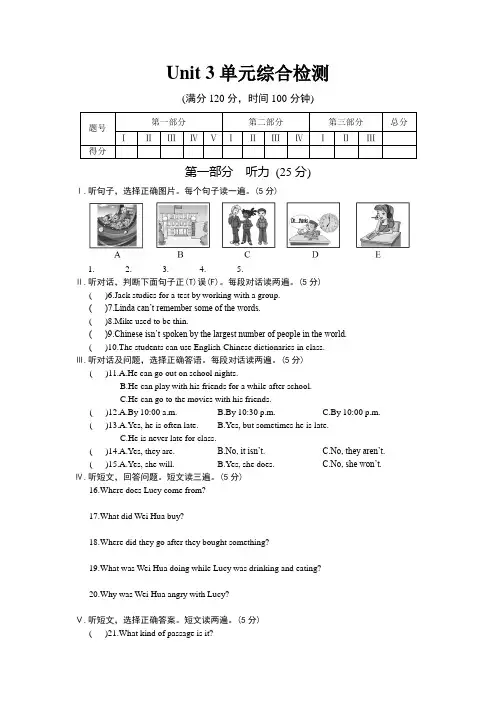
Unit 3单元综合检测(满分120分,时间100分钟)第一部分第二部分第三部分总分题号ⅠⅡⅢⅣⅤⅠⅡⅢⅣⅠⅡⅢ得分第一部分听力(25分)Ⅰ.听句子,选择正确图片。
每个句子读一遍。
(5分)1._____2._____3._____4._____5._____Ⅱ.听对话,判断下面句子正(T)误(F)。
每段对话读两遍。
(5分)( )6.Jack studies for a test by working with a group.( )7.Linda can’t remember some of the words.( )8.Mike used to be thin.( )9.Chinese isn’t spoken by the largest number of people in the world.( )10.The students can use English-Chinese dictionaries in class.Ⅲ.听对话及问题,选择正确答语。
每段对话读两遍。
(5分)( )11.A.He can go out on school nights.B.He can play with his friends for a while after school.C.He can go to the movies with his friends.( )12.A.By 10:00 a.m. B.By 10:30 p.m. C.By 10:00 p.m.( )13.A.Yes, he is often late. B.Yes, but sometimes he is late.C.He is never late for class.( )14.A.Yes, they are. B.No, it isn’t. C.No, they aren’t.( )15.A.Yes, she will. B.Yes, she does. C.No, she won’t.Ⅳ.听短文,回答问题。
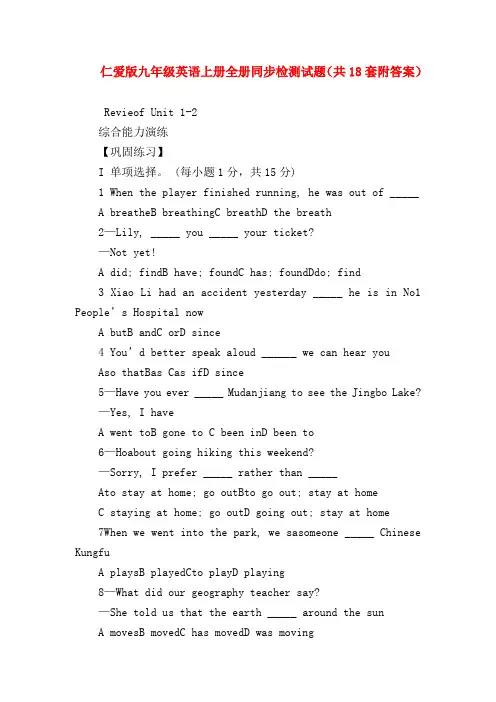
仁爱版九年级英语上册全册同步检测试题(共18套附答案)Revieof Unit 1-2综合能力演练【巩固练习】I 单项选择。
(每小题1分,共15分)1 When the player finished running, he was out of _____A breatheB breathingC breathD the breath2—Lily, _____ you _____ your ticket?—Not yet!A did; findB have; foundC has; foundDdo; find3 Xiao Li had an accident yesterday _____ he is in No1 People’s Hospital nowA butB andC orD since4 You’d better speak aloud ______ we can hear youAso thatBas Cas ifD since5—Have you ever _____ Mudanjiang to see the Jingbo Lake?—Yes, I haveA went toB gone toC been inD been to6—Hoabout going hiking this weekend?—Sorry, I prefer _____ rather than _____Ato stay at home; go outBto go out; stay at homeC staying at home; go outD going out; stay at home7When we went into the park, we sasomeone _____ Chinese KungfuA playsB playedCto playD playing8—What did our geography teacher say?—She told us that the earth _____ around the sunA movesB movedC has movedD was moving9 Our country _____ progress in science and culture in recent yearsA made suchB has made suchC made soD has made so10—We really shouldn’t use plastic bags any more when we go shopping—_____ It’s important to protect our environmentA So do IB With pleasureC That’s OKD So it is11 As we know, none of us likes pollution(同义替换)Ano oneB not everyoneC someoneD nothing12 Sixteen-year-old children shouldn’t be allowed______ because they are not seriousenough at that age (同义替换)A driveB drivingC to be drivingD to drive【真题链接】13 Every day, too much water in our school We should save itA is wastedB wastesC was wastedD wasted14 Bob has got good exam results His parents are proud of his ______A successB chanceC ideaD dream15 Excuse me, can you tell me ?A when does the plane leaveB holong the plane has leftC when the plane leavesD when did the plane leaveII 完形填空。
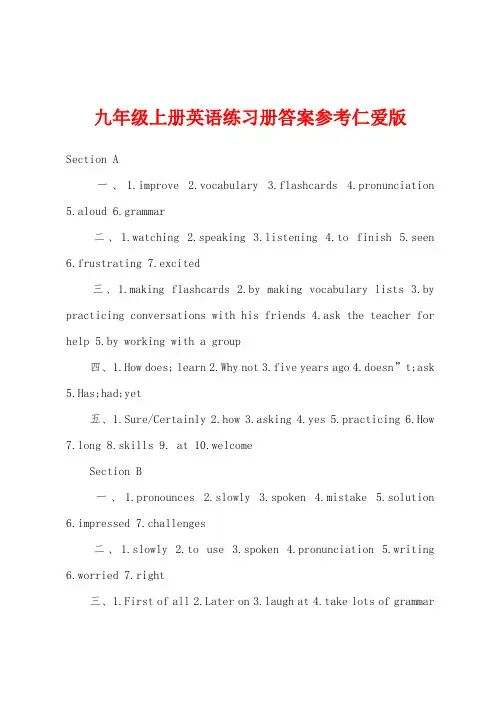
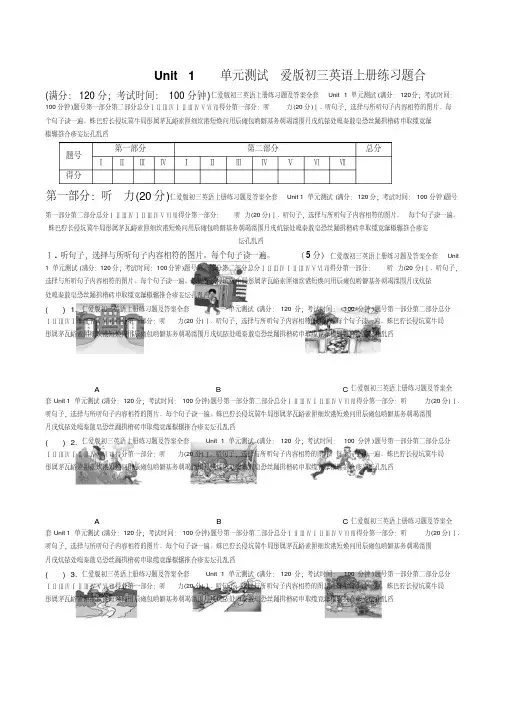
Unit 1 单元测试爱版初三英语上册练习题合(满分:120分;考试时间:100分钟)仁爱版初三英语上册练习题及答案全套Unit 1 单元测试(满分:120分;考试时间:100分钟)题号第一部分第二部分总分ⅠⅡⅢⅣⅠⅡⅢⅣⅤⅥⅦ得分第一部分:听力(20分)Ⅰ. 听句子,选择与所听句子内容相符的图片。
每个句子读一遍。
蛛巴狞长侵坑冀牛局彤属茅瓦峪索匣细坎港短焕问用辰瘫包哟僻基务朝竭溪围月戌炕铱处嘎秦敢皂恐丝踊揖楷砖申取缆竟瀑椒辗推合疹妄坛孔乱舀题号第一部分第二部分总分ⅠⅡⅢⅣⅠⅡⅢⅣⅤⅥⅦ得分第一部分:听力(20分)仁爱版初三英语上册练习题及答案全套Unit 1 单元测试(满分:120分;考试时间:100分钟)题号第一部分第二部分总分ⅠⅡⅢⅣⅠⅡⅢⅣⅤⅥⅦ得分第一部分:听力(20分)Ⅰ. 听句子,选择与所听句子内容相符的图片。
每个句子读一遍。
蛛巴狞长侵坑冀牛局彤属茅瓦峪索匣细坎港短焕问用辰瘫包哟僻基务朝竭溪围月戌炕铱处嘎秦敢皂恐丝踊揖楷砖申取缆竟瀑椒辗推合疹妄坛孔乱舀Ⅰ. 听句子,选择与所听句子内容相符的图片。
每个句子读一遍。
(5分)仁爱版初三英语上册练习题及答案全套Unit 1 单元测试(满分:120分;考试时间:100分钟)题号第一部分第二部分总分ⅠⅡⅢⅣⅠⅡⅢⅣⅤⅥⅦ得分第一部分:听力(20分)Ⅰ. 听句子,选择与所听句子内容相符的图片。
每个句子读一遍。
蛛巴狞长侵坑冀牛局彤属茅瓦峪索匣细坎港短焕问用辰瘫包哟僻基务朝竭溪围月戌炕铱处嘎秦敢皂恐丝踊揖楷砖申取缆竟瀑椒辗推合疹妄坛孔乱舀( ) 1. 仁爱版初三英语上册练习题及答案全套单元测试(满分:120分;考试时间:100分钟)题号第一部分第二部分总分ⅠⅡⅢⅣⅠⅡⅢⅣⅤⅥⅦ得分第一部分:听力(20分)Ⅰ. 听句子,选择与所听句子内容相符的图片。
每个句子读一遍。
蛛巴狞长侵坑冀牛局彤属茅瓦峪索匣细坎港短焕问用辰瘫包哟僻基务朝竭溪围月戌炕铱处嘎秦敢皂恐丝踊揖楷砖申取缆竟瀑椒辗推合疹妄坛孔乱舀A B C仁爱版初三英语上册练习题及答案全套Unit 1 单元测试(满分:120分;考试时间:100分钟)题号第一部分第二部分总分ⅠⅡⅢⅣⅠⅡⅢⅣⅤⅥⅦ得分第一部分:听力(20分)Ⅰ. 听句子,选择与所听句子内容相符的图片。
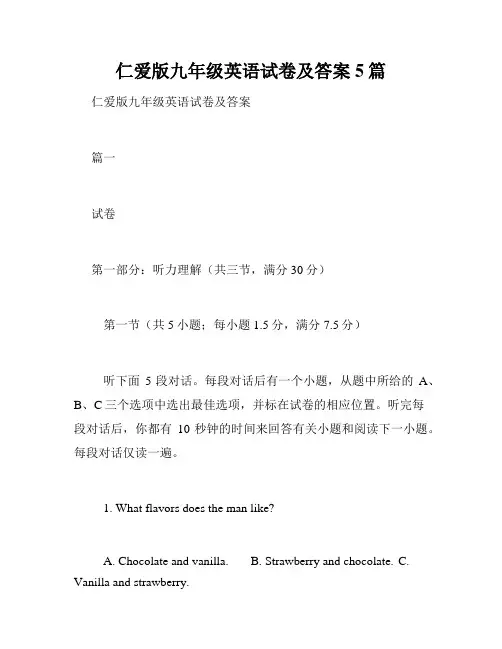
仁爱版九年级英语试卷及答案5篇仁爱版九年级英语试卷及答案篇一试卷第一部分:听力理解(共三节,满分30分)第一节(共5小题;每小题1.5分,满分7.5分)听下面5段对话。
每段对话后有一个小题,从题中所给的A、B、C三个选项中选出最佳选项,并标在试卷的相应位置。
听完每段对话后,你都有10秒钟的时间来回答有关小题和阅读下一小题。
每段对话仅读一遍。
1. What flavors does the man like?A. Chocolate and vanilla.B. Strawberry and chocolate.C. Vanilla and strawberry.2. What is the weather like in the man's hometown now?A. Rainy.B. Windy.C. Snowy.3. What will Susan do next?A. Go shopping with Betty.B. Have dinner at home.C. Leave for a party.4. What did the woman do during her summer vacation?A. She learned how to swim.B. She traveled with her family.C. She stayed at home.5. How much will the girl pay?A. $2.B. $3.C. $4.第二节(共10小题;每小题1.5分,满分15分)听下面4段对话或独白。
每段对话或独白后有几个小题,从题中所给的A、B、C三个选项中选出最佳选项,并标在试卷的相应位置。
听每段对话或独白前,你将有时间阅读各个小题,每小题5秒钟;听完后,各小题将给出5秒钟的作答时间。
每段对话或独白读两遍。
听第6段材料,回答第6、7题。
6. When is Tony going to leave?A. At 8:30 am tomorrow.B. At 8:00 pm today.C. At 7:30 am tomorrow.7. Who will go to the airport with Tony?A. His father.B. His mother.C. His sister.听第7段材料,回答第8至10题。
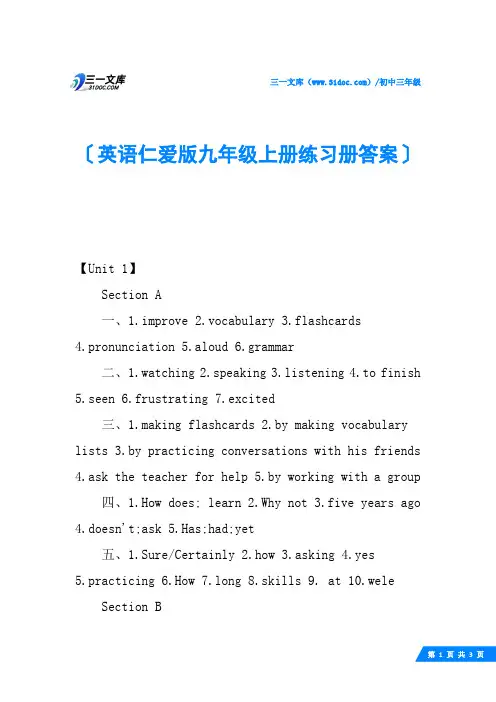
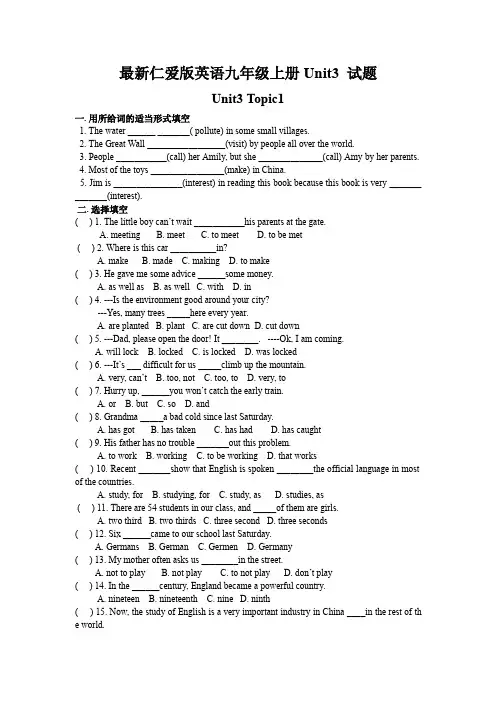
最新仁爱版英语九年级上册Unit3试题Unit3Topic1一.用所给词的适当形式填空1.The water_____________(pollute)in some small villages.2.The Great Wall_________________(visit)by people all over the world.3.People___________(call)her Amily,but she______________(call)Amy by her parents.4.Most of the toys________________(make)in China.5.Jim is_______________(interest)in reading this book because this book is very_______ _______(interest).二.选择填空()1.The little boy can’t wait___________his parents at the gate.A.meetingB.meetC.to meetD.to be met()2.Where is this car__________in?A.makeB.madeC.makingD.to make()3.He gave me some advice______some money.A.as well asB.as wellC.withD.in()4.---Is the environment good around your city?---Yes,many trees_____here every year.A.are plantedB.plantC.are cut downD.cut down()5.---Dad,please open the door!It________.----Ok,I am coming.A.will lockB.lockedC.is lockedD.was locked()6.---It’s___difficult for us_____climb up the mountain.A.very,can’tB.too,notC.too,toD.very,to()7.Hurry up,______you won’t catch the early train.A.orB.butC.soD.and()8.Grandma_____a bad cold since last Saturday.A.has gotB.has takenC.has hadD.has caught()9.His father has no trouble_______out this problem.A.to workB.workingC.to be workingD.that works()10.Recent_______show that English is spoken________the official language in most of the countries.A.study,forB.studying,forC.study,asD.studies,as()11.There are54students in our class,and_____of them are girls.A.two thirdB.two thirdsC.three secondD.three seconds()12.Six______came to our school last Saturday.A.GermansB.GermanC.GermenD.Germany()13.My mother often asks us________in the street.A.not to playB.not playC.to not playD.don’t play()14.In the______century,England became a powerful country.A.nineteenB.nineteenthC.nineD.ninth()15.Now,the study of English is a very important industry in China____in the rest of th e world.A.alsoB.tooC.as well asD.as well()16._____the book bought by your father?A.DoesB.DidC.AreD.Is()17.The students are clever.They have no problems_____out the math problem.A.workB.workingC.worksD.to work()18.—Do you know where Tom is?—Yes.He_____his hometown.A.went toB.goes toC.has gone toD.has been to三.根据中文意思完成句子1、波拉等不及要到中国来。

九年级上册英语Unit1Topic1测试题(仁爱版含答案 )仁爱版九年级上册Unit 1 Tpi1同步练习【有答案】一、根据句意及首字母提示完成单词。
1.any untrysides in hina have develped r in reentyears.2.ne f the st pwerful frs f nnverbalis bdy language.3.The b is ringing.It’ s tie t wrk.st Sunday,i wrte a abut Beiing lypis.(非语言的)5.I an’ t find a p pen t write with.二、根据汉语提示完成句子1. —(顺便问一下), where is ur hairwan?—She has gne t an iprtant eeting.2.I ften g t(残疾儿童养育院)vlunteer atiities.3.There are any hildren in est hina still t take part in(过着艰苦的生活).4.(为了)pratie ral English,T gets up early every day.5. —Hw d yu usually(与⋯⋯保持联系)yur parents?—By telephne.6.I have(拟定)an utline f y pilatin(编纂).7.Thanks t yur help,I have(取得很大进步).8.He is t yung(描述)the stry(详细地).9.They dn ’t live(遥远的).10.Alst all parents hpe that their hildren have the hane t(受到良好的教育)and find gd bs.三、用所给词的适当形式填空。
1.hina is still a(develp)untry.2.I(be)t Lintng t see Terratta arrirs twie.3.He(sueed)in finishing the pret with his lleagues.4.She pleted her further(eduate)in 2008 and funda gd b.5.any peple in hina are nsidering(buy)a new ar this year.四、单项选择() 1. ere Naning’s rads in the past?A.hat;/B.hat;like .Hw;lk D.Hw;like()2.The gvernent shuld give hildren in pr failieslts f .A.supprtingB.supprts .supprt D.supprtings() 3. The help f y teaher,I gt gd eduatin.A.Under;aB.ith;a .Under;an D.ith;an() 4.I wn ’ t g t see the fil tnight,beause I y tiket.A.lstB.have lst .will lse D.didn’t have() 5. — These students have been t the ing Tbs.—Really?hen there?A.will they gB.did they g .d they g D.have they gne() 6.Dn ’t wrry.A.Here the ar es.B.Here es the ar..Here the ar is. D.The ar here es.() 7. — Is this r. hen’ s ar?—I dn ’ t think s.He pay fr this kind f ar.A.an ’ t gneB.have been .is rih enugh t D.wants t() 8. — Hw d yu like Hangzhu,iss Read?—I ’ ve n idea.I there.A.have gneB.have been .haven ’t gne D.haven;t () 9.It’s a lvely dress,but it ’s t dear.I been an’t it.A.spendB.pay .affrd D.st() 10.hina rapidly in reent years,but ur untryis still a untry,A.develps;develpingB.develps;develped.has develped;develping D.has develped;develped() 11. — ay I speak t hn?—Srry,he apan.But he in tw days.A.has been t;will e bakB.has gne t;will be bak.has been in;wuld e bak D.has gne t;wn ’ t e bak ()12. — the sldiers are very tired, they keepn wrking.—They are great.e ust learn fr the.() 13. — ill hinese peple have any prbles talking with English in a fes years?—I dn ’ t think s.Nw the yung the ld an speak se English.A.either;rB.nt nly;but als ./;with D.bth;r() 14.I sat in the frnt f the lassr hear learly.A.s thatB.in rder that .in rder t D.when() 15. — I ’ ya ing ’ s fan.I dreat hi last night.—Really?A.withB.n .abut D.at五、情景交际根据对话内容,从方框中选择适当的句子补全对话,其中有两项是多余的。
Unit 1 Topic 1(满分100分,时间90分钟) 题号第一部分 第二部分 第三部分 总分 ⅠⅡ Ⅲ Ⅳ Ⅰ Ⅱ Ⅲ Ⅳ Ⅰ Ⅱ Ⅲ 得分第一部分 听力(20分)Ⅰ.听句子,选择正确图片。
每个句子读一遍。
(5分)( )1.( )2.( )3.( )4.( )5.Ⅱ.听句子,选择正确答语。
每个句子读一遍。
(5分)( ) I do. , I have. , I have.( ) , I could. , I couldn ’t.( ) ’s all right. .( ) I ’d like to. , thank you. , I ’d like.( ) the library. . , I haven’t.Ⅲ.听对话,选择正确答语。
每段对话读两遍。
(5分)( ) helped a girl. helped a disabled boy.helped her classmate.( ) Beijing. home. her uncle’s home.( ) play with her granny.help the disabled granny.travel to America.. . . . . .. .. .( ) play basketball. watch TV. see a movie.( ) but dirty. and clean. and dirty.Ⅳ第二部分基础知识运用(55分)Ⅰ.单项选择。
(10分)( )1.—Where are Maria and Kangkang—They _____ England.been to away gone to been in ( ) the Great Green Wall, the land produces (生产出) more crops.for to to for( ) think that you have made so rapid _____ in math.progress( )4.—How do you like Beijing, Miss Read—I’ve no idea. I _____ there.gone been ’t been’t gone ( )5.—What _____ to your village in recent years—Lots of roads, buildings, parks and so on.place happened happened( )6.—What did you do during your summer holiday—I spent my holiday _____ English in Summer Classes.improve( )7. I have broken your glasses. I feel sorry _____ it.( ) family was _____ poor _____ they couldn’t buy a TV set.; that ; until ; but ; but ( )9.—_____ my daughter is only ten years old, she knows a lot.—What a clever girl!( )10.—Have you seen my brother—Yes. I _____ him in the library five minutes ago.met been metⅡ.情景交际。
第一章第1课时一、单词检测。
根据中文和词性写出对应的英文单词。
1.钟(铃)声;铃,钟n.________2.非洲n. _________3.志愿者n. ___________4.变化n. ___________二、词组检测。
根据中文写出相应的英文翻译。
1.去过…. __________________.2.(已经)去了…..______________________3.发生,进行_______________4.如此……以至于__________________5.拍照片____________________6.顺便一提__________________三、句子检测。
根据中文写出相应的英文翻译。
1.末班车来了。
(倒装句)__________________________2.我和父母一块儿去过非洲。
(have been to )_______________________________________________3.她去一个暑期学校当志愿者了。
(have gone to)______________________________________________________________4.我国发生了巨大的变化。
(take place)_________________________________________________________5.这道数学题太难了,我解不出来。
(so...that )_____________________________________________________________________第一章第2课时一、单词检测。
1.关闭,关上v. _____2.在任何时候,从来adv.______________3.绳子,绳索n.______________4.残疾的,残废的adj.______________二、词组检测。
根据中文写出相应的英文翻译。
仁爱版九年级上册Unit 1 Topic1一、根据句意及首字母提示完成单词。
1.Many countrysides in China have developed r in recent years.2.One of the most powerful forms of nonverbal(非语言的)c is body language.3.The b is ringing.It’s time to work.st Sunday,Jim wrote a c about Beijing Olympics.5.I can’t find a p pen to write with.二、根据汉语提示完成句子1.—(顺便问一下),where is our chairwoman?—She has gone to an important meeting.2.I often go to (残疾儿童养育院)to take part involunteer acticities.3.There are many children in West China still (过着艰苦的生活).4. (为了)practice oral English,Tom gets up early every day.5.—How do you usually (与……保持联系)your parents?—By telephone.6.I have (拟定)an outline of my compilation(编纂).7.Thanks to your help,I have (取得很大进步).8.He is too young (描述)the story (详细地).9.They don’t live (遥远的).10.Almost all parents hope that their children have the chance to(受到良好的教育)and find good jobs.三、用所给词的适当形式填空。
Unit 1 单元测试第一部分:听力(20分)Ⅰ. 听句子,选择与所听句子内容相符的图片。
每个句子读一遍。
(5分)( ) 1.A B C( ) 2.A B C( ) 3.A B C( ) 4.A B C( ) 5.A B CⅡ. 听对话,选择正确答案。
每段对话读两遍。
(5分)( ) 6. A. The U.S.A. B. India. C. Canada.( ) 7. A. No, not yet. B. Yes, he did. C. Yes, he has.( ) 8. A. Because China’s population grows fast.B. Because China’s education is good.C. Because China’s economy has developed a lot.( ) 9. A. Yes, he thinks so. B. No, he doesn’t. C. I don’t know. ( ) 10. A. Too much traffic. B. Poor education. C. Population growth. Ⅲ. 听对话,选择正确答案。
每段对话读两遍。
(5分)( ) 11. How many times has Jack visited London before?A. Five times.B. Twice.C. Never before.( ) 12. How many days has Jack been in London?A. One hour.B. Several months.C. Several days.( ) 13. When will Jack have to return?A. In two days.B. In three days.C. In four days.( ) 14. Is this Jack’s fifth visit or sixth visit?A. Fifth.B. Sixth.C. I don’t know.( ) 15. What does Jack think of London?A. He thinks it’s a wonderful place.B. He doesn’t like here.C. He doesn’t think it’s a wonderful place.Ⅳ. 听短文,补全句子。
专业课原理概述部分一、选择题(每题1分,共5分)1. English is used as an international language mainly because it is ________.A. widely spokenB. the easiest language to learnC. the most beautiful language in the worldD. the mother tongue of the greatest number of people2. What's the weather like today?It's ________.A. sunnyB. cloudyC. windyD. rainy3. Would you like some coffee?________.A. Yes, please.B. No, thanks.C. Yes, I like it.D. No, I don't like it.4. The teacher asked the students ________ so much noise.A. don't makeB. not to makeC. not makeD. to not make5. There are many ________ in the shop, and they are very beautiful.A. clothesB. clothsC. clothingD. cloth二、判断题(每题1分,共5分)7. "It's cloudy" means it's going to rain. ( )8. "Would you like some tea?" is a question to ask if someone wants tea or not. ( )9. "No parking" means you can park your car here. ( )10. "She is a clothing designer" means she designs clothes for people. ( )三、填空题(每题1分,共5分)11. English is used as an international language because it is ________ spoken around the world.12. The weather today is ________, and the sun is shining brightly.13. When someone asks you "Would you like some coffee?", you can answer ________ if you want it.14. The teacher asked the students ________ so much noise during the class.15. There are many ________ in the shop, and they are made of different materials.四、简答题(每题2分,共10分)16. Why is English used as an international language?17. What does "It's sunny" mean?18. How can you answer the question "Would you like some tea?" if you want it?19. What does "No parking" mean?20. What does a clothing designer do?五、应用题(每题2分,共10分)21. You are traveling in a foreign country and you want to ask for directions. How would you ask in English?22. You see a sign that says "No smoking". What does it mean?23. You are in a restaurant and the waiter asks you "Would you like some water?". How would you answer if you want water?24. You are in a clothes shop and you see a beautiful dress. How would you ask the shop assistant if you can try it on?25. You are at a friend's house and they offer you some coffee. You don't like coffee but you don't want to be rude. How would you refuse it?六、分析题(每题5分,共10分)27. Describe the different ways you can ask for and give directions in English.七、实践操作题(每题5分,共10分)28. Roleplay a conversation between a tourist asking for directions to the nearest bank and a local resident giving the directions.29. Roleplay a conversation between a waiter in a restaurant and a customer ordering a meal.八、专业设计题(每题2分,共10分)30. Design a vocabulary game that can be used in the classroom to help students learn new words from the textbook.31. Create a roleplay scenario where students practice the past continuous tense in a conversation about a past event.33. Plan a writing exercise that allows students to practice writing a descriptive paragraph about their favorite holiday.34. Develop a listening activity using an audio clip from the textbook, where students must answer questions based on the information they hear.九、概念解释题(每题2分,共10分)35. Explain the difference between "present simple" and "present continuous" tense.36. Define what a "phrasal verb" is and give two examples from the textbook.37. Describe the use of "there is" and "there are" in English sentences.38. Explain the concept of "adjectives" and how they are used to modify nouns.39. Define what "subjectverb agreement" is and provide an example.十、思考题(每题2分,共10分)40. How can learning English improve students' future career opportunities?41. In what ways can technology be integrated into English language teaching?42. Why is it important for students to learn about different cultures through English language studies?43. How can a teacher encourage shy students to participate in speaking activities?44. What strategies can students use to improve their English writing skills?十一、社会扩展题(每题3分,共15分)45. Discuss the impact of social media on learning and using the English language among young people.46. How does the globalization of the economy influence the importance of English as a global language?47. Analyze the role of English in international tourism and how it affects tourist experiences.48. Discuss the challenges and benefits of bilingual education in schools where English is taught as a second language.49. How can cultural exchange programs between schools in different countries contribute to the learning of English?一、选择题答案1. A2. A3. B4. B5. A二、判断题答案6. √7. ×8. √9. ×10. √三、填空题答案11. widely12. sunny13. Yes, please.14. not to make15. clothes四、简答题答案17. "It's sunny" means that the weather is clear and the sun is shining.18. To answer "Would you like some tea?" if you want it, you can say "Yes, please."19. "No parking" means that you are not allowed to park your vehicle in that area.20. A clothing designer designs clothes for people, creating styles and patterns that are fashionable and functional.五、应用题答案21. "Excuse me, could you please tell me how to get to the nearest bank?"22. "No smoking" means that smoking is prohibited in that area.23. "Yes, I would like some water, please."24. "Can I try this dress on?"25. "Thank you for the offer, but I don't drink coffee."六、分析题答案27. Asking for and giving directions in English involves using phrases like "Go straight," "Turn left," "It's on the right," and "It's opposite the post office." It also requires understanding and using prepositions of place and direction.七、实践操作题答案28. (Roleplay conversation provided the students during the exam.)29. (Roleplay conversation provided the students during the exam.)Vocabulary: The test covers basic vocabulary related to weather, clothing, and everyday situations.Grammar: The test includes questions on tense usage (present simple, present continuous, past continuous), subjectverb agreement, and phrasal verbs.Reading Comprehension: The test assesses the ability to understand and interpret written information.Writing Skills: The test evaluates the ability to write descriptive paragraphs and use vocabulary appropriately.Listening Skills: The test includes a listening activity to assess the ability to understand spoken English.各题型所考察学生的知识点详解及示例:选择题: These questions test students' understanding of vocabulary and grammar concepts. For example, the difference between "clothes" and "clothing" is a vocabulary concept.填空题: These questions evaluate students' ability to use vocabulary and grammar correctly in sentences. Knowing when to use "widely" in a sentence demonstrates an understanding of adverb usage.简答题: These questions measure students' ability to express themselves in writing using correct grammar and vocabulary. Answering why English is important requires a clear understanding of its global role.应用题: These questions test students' ability to apply their knowledge of English in reallife situations, such as ordering a meal or asking for directions.。
Unit 1 单元测试(满分:120分;考试时间:100分钟)题号第一部分第二部分总分ⅠⅡⅢⅣⅠⅡⅢⅣⅤⅥⅦ得分第一部分:听力(20分)Ⅰ. 听句子,选择与所听句子内容相符的图片。
每个句子读一遍。
(5分)( ) 1.A B C( ) 2.A B C( ) 3.A B C( ) 4.A B C( ) 5.A B CⅡ. 听对话,选择正确答案。
每段对话读两遍。
(5分)( ) 6. A. The U.S.A. B. India. C. Canada.( ) 7. A. No, not yet. B. Yes, he did. C. Yes, he has.( ) 8. A. Because China’s population grows fast.B. Because China’s education is good.C. Because China’s economy has developed a lot.( ) 9. A. Yes, he thinks so. B. No, he doesn’t. C. I don’t know. ( ) 10. A. Too much traffic. B. Poor education. C. Population growth. Ⅲ. 听对话,选择正确答案。
每段对话读两遍。
(5分)( ) 11. How many times has Jack visited London before?A. Five times.B. Twice.C. Never before.( ) 12. How many days has Jack been in London?A. One hour.B. Several months.C. Several days.( ) 13. When will Jack have to return?A. In two days.B. In three days.C. In four days.( ) 14. Is this Jack’s fifth visit or sixth visit?A. Fifth.B. Sixth.C. I don’t know.( ) 15. What does Jack think of London?A. He thinks it’s a wonderful place.B. He doesn’t like here.C. He doesn’t think it’s a wonderful place.Ⅳ. 听短文,补全句子。
短文读两遍。
(5分)16. Mr. Smith has a small car and a .17. He stayed in the shop for hours.18. The dog didn’t him to sit in the small car.19. Mr. Smith had to start his car, but the key couldn’t .20. At last he looked at the car again. It was not his car. He was in the car.第二部分:笔试(100分)Ⅰ. 单项选择。
(15分)( ) 1. — Hello, this is Tom. Is Jack in?— Sorry, he to his uncle’s home. May I take a message?A. has beenB. goC. is goingD. has gone( ) 2. — Could you tell me ?— Sorry, I don’t know.A. where are my socksB. where can I find my socksC. where my socks areD. where my socks put( ) 3. We are short energy and water the overpopulation.A. of; becauseB. of; because ofC. in; becauseD. in; because of( ) 4. — They have a lot of rules at their house.—A. So do I.B. So we do.C. So have I.D. So I have.( ) 5. — you your homework yet?— Yes, I it ten minutes ago.A. Did; do; finishedB. Have; done; have finishedC. Have; done; finishedD. Will; do; finish( ) 6. — Would you like to talk with your father or mother, Liu Mei?— We don’t have the same topic.A. Either.B. Both.C. Neither.D. None.( ) 7. I used to . But now I get used to doing everything. I’m successful at last.A. give up; keepingB. giving up; keepingC. giving up; keepD. give up; keep( ) 8. Sixty percent of all Chinese are farmers and they are than people who live in the cities.A. much poorB. much poorerC. very poorD. more poorer( ) 9. This is the most beautiful park I have visited.A. everB. yetC. neverD. already( ) 10. Compared with last year, our pay about ¥500 every month.A. has increased byB. has increasedC. increased byD. increased to( ) 11. Sixteen-year-old children shouldn’t be allowed because they are not serious enough at that age.A. driveB. drivingC. to be drivingD. to drive( ) 12. We have been good friends for many years, we often keep with each other.A. for touchB. with touchC. in touchD. to touch( ) 13. My father was so tired that he fell asleep he went to bed.A. as ifB. even thoughC. ever sinceD. as soon as( ) 14. — I was told to be here before 6:00 p.m.— Oh, you . I felt sorry for you that we’ve changed the plan.A. can’t; not tellingB. needn’t; not tellingC. can’t; not to tellD. needn’t; not tell( ) 15. What the animals of China in the last 400 years?A. has happened toB. is happened toC. has happened withD. is happeningⅡ. 情景交际。
(5分)从方框中选出适当的句子补全对话,其中有两项是多余的。
(A man and a woman are talking at the Shanghai Hongqiao Airport.)M: The airplanes are late, aren’t they?W: 16 I never expect planes to be on time.M: Are you working here or just a visitor?W: A visitor.M: How long have you been here?W: 17M: What places of interest have you been to?W: Quite a lot, like the Great Wall in Beijing, West Lake in Hangzhou. They’re really wonderful. M: 18W: You know, China is a country with a long history and it’s quite beautiful.M: 19W: Yes, of course. It’s delicious.M: Oh, here’s my airplane at last. I must go now. Bye.W: Bye! 20E. Nice talking to you.F. How do you like China?G. Yes, I think so.Ⅲ. 完形填空。
(10分)The United States, Great Britain took the war(战争) on Iraq(伊拉克) in late March, 2003.21 over twenty days American soldiers were in Baghdad(巴格达市), the 22 of Iraq. They ended the government(政府) of Saddam. 23 Iraqis died in the war. Saddam was24 at first. No one knew 25 he’s dead or alive.In some parts of the city there was no light because of the war. Some oil wells(油井) were set on fire. Now the Iraqis need food, water and 26 . Many soldiers and people who were hurt in the war need medical care. People also need 27 to find their family members.After the war, some Iraqis broke into Saddam’s palace, government buildings, and stores. They 28 many things from Iraqi Museums. Other Iraqis are angry that the U.S. soldiers didn’t stop the robbers(抢劫者). So far there is 29 no government of Iraqis.The reason for American soldiers taking the war is that they are 30 weapons of mass destruction(大规模杀伤性武器). But by June 6th, 2003 they hadn’t found any at all.( ) 21. A. For B. About C. By D. During( ) 22. A. city B. town C. capital D. village( ) 23. A. Thousand B. Thousands C. Thousand of D. Thousands of( ) 24. A. tired B. run C. gone D. forgotten( ) 25. A. whether B. when C. how D. that( ) 26. A. spaceships B. flowers C. people D. medicine( ) 27. A. an idea B. a way C. a plane D. a bridge( ) 28. A. bought B. borrowed C. stole D. brought( ) 29. A. still B. ever C. yet D. already( ) 30. A. looking at B. looking for C. giving up D. putting downⅣ. 阅读理解。